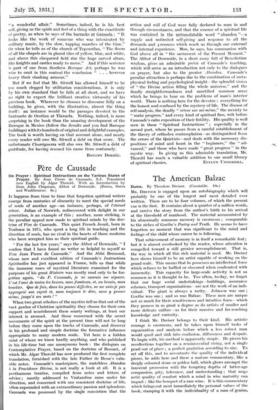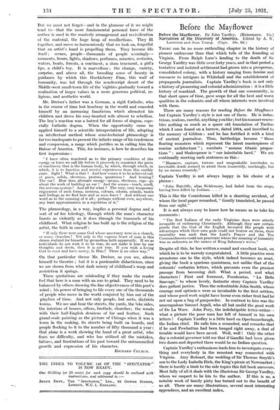The American Balzac
Dawn. By Theodore Dreiser. (Constable. 10s.) MR. DREISER is engaged upon an autobiography which will probably be one of the longest and most detailed ever written. There are to be four volumes, of which the present one is the first. It contains about a quarter of a million words, and can ies the story from the author's birth to his arrival at the threshold of manhood. The material accumulated by his abnormally sensuous memory is enormous ; comparable to the riches of Goethe's Poetry and Truth. He seems to have forgotten no moment that was significant to the mind and feelings of the child whose career he is following.
That achievement of memory is in itself a remarkable feat; but it is almost overlooked by the reader, whose attention is compelled toward a still greater accomplishment. That is, the way in which all this rich material is used. Mr. Dreiser here shows himself to be an artist capable of working on the grand scale. This means that he possesses an intellectual force which refuses to be baffled or obscured when confronted with immensity. This capacity for large-scale activity is not so common as it is thought to be. Too often, to-day, we forget that our huge social undertakings—buildings, assurance schemes, transport organizations—are not the work of an indi- vidual. The giant is always a rarity. Johnson was one ; Goethe was one ; and so was Balzac. These men are unique not so much for their sensitiveness and intuitive force—which they possess in as great a degree as do artists of smaller and more delicate calibre—as for their massive and far-reaching knowledge and curiosity.
I think Mr. Dreiser belongs to their kind. His artistic courage is enormous, and he takes upon himself tasks of organization and analysis before which a less robust man would quail and sink into confusion, diffuseness and despair. To begin with, his method is apparently simple. He pieces his recollections together on a reminiseential string, not a single pearl out of place ; a perfect gradation according to size. To set off this, and to accentuate the quality of the individual pieces, he adds here and there a mature commentary, like a deeply coloured stone or golden ball, which glows amongst the innocent procession with the tempting depths of latter-age compassion, pity, tolerance, and understanding ; that mag- netic quality of comfort which a mind in wise maturity can impart ; like the bouquet of a rare wine. It is this commentary which brings out most immediately the personal values of the book, stamping it with the individuality of a man of genius.
But we must not forget—and in the glamour of it we might tend to—that the more fundamental personal force of the author is, used in the masterly arrangement and revivification of the material, the huge heap of recollections. They fit together, and move so harmoniously that we look on, forgetful that an artist's hand is propelling them. They become life itself ; scenes, people—thousands of people seemingly— moments, hours, lights, shadows, perfumes, miseries, ecstasies, waters, boats, forests, a continent, a slum tenement, a girl's lips, a child's toy. It is marvellous ; the change, variety,
surprise, and above all, the brooding sense of beauty in guidance by which this Huckleberry Finn, this waif of humanity, was led through the nondescript desert of the Middle-west small-town life of the 'eighties gradually toward a realization of larger values in a more generous political, re- ligious, and aesthetic world.
Mr. Dreiser's father was a German, a rigid Catholic, who in the course of time lost headway in the world and consoled himself by an increasing fanaticism which alienated his
children and drove his easy-hearted wife almost to rebellion. The boy's reaction was a hatred for all forms of dogma, espe- cially Catholic dogma. When the opportunity came he applied himself to a scientific interpretation of life, adopting an intellectual method whose semi-technical phraseology is
far too inadequate to present the infinite range of his tenderness and compassion, a range which justifies us in calling him the Balzac of America. This, for instance, is how he describes his first impressions :
" I have often wondered as to the primary condition of the energy or force we call life before it proceeds to construct the piece. of machinery that is the human body, by which, through which, in which, it is to function and receive experiences from this earthly state. Sight ! What is that ? And how comes it to be achieved out of gases, solids, electrons, protons, quantums ? And hearing ! The ear ! How does ultimate energy—atoms, electrons, ergs—go about the work of building an ear ? And the senses—touch, smell, the nervous system ! And all for what ? The very, very temporary enjoyment of such forms, motions, colours, odours, sounds, tastes and feelings as we find here and so soon leave ? And without one word as to the meaning of it all ; perhaps without ever, anywhere, any least approximation to a repetition of it."
The phraseology, in a way, implies a personal dogma and a sort of ad hoc teleology, through which the man's character
bursts as violently as it does through the trammels of his childhood. What religion he has built up is the religion of the artist, the faith in oneself :
"If only there were some God whose sanctuary were in a church, or many churches ! Yet only in the vagrom heart of man is this dream realized for himself by groundless faith apparently. If we as individuals do not wish it to be true, do not make it true by our thoughts and deeds, then it is not true. If you wish a loving God to exist and have mercy, be Him ! There is no other way."
On that particular theme Mr. Dreiser, as you see, allows himself to theorize ; but it is a pardonable didacticism, since we are shown from what dark misery of childhood's warp and restriction it springs.
These quotatiOns are misleading if they make the reader feel that here is a man with an axe to grind. They need to be balanced by others showing the fine objectiveness of this poet's mind ; his power of bringing to life every one of the thousands of people who move in the world conjured by him out of the playbox of time. And not only people, but sects, districts towns. We see and hear the streets, the yards, the lake sides, the interiors of houses, offices, brothels, Churches ; the woods With their half-English denizens of fur and feather. was grand-scale painting as the licture of Chicago when it was a town ha the making, its streets being built on boards, and ptolale 'flocking to it to the number of fifty thousand a year that alone is a work showing the hand of a great artist, who fears no difficulty, and who has utilized all the mistakes, failures, and frustrations of his past toward the untraminelled growth and expression of his character.











































 Previous page
Previous page